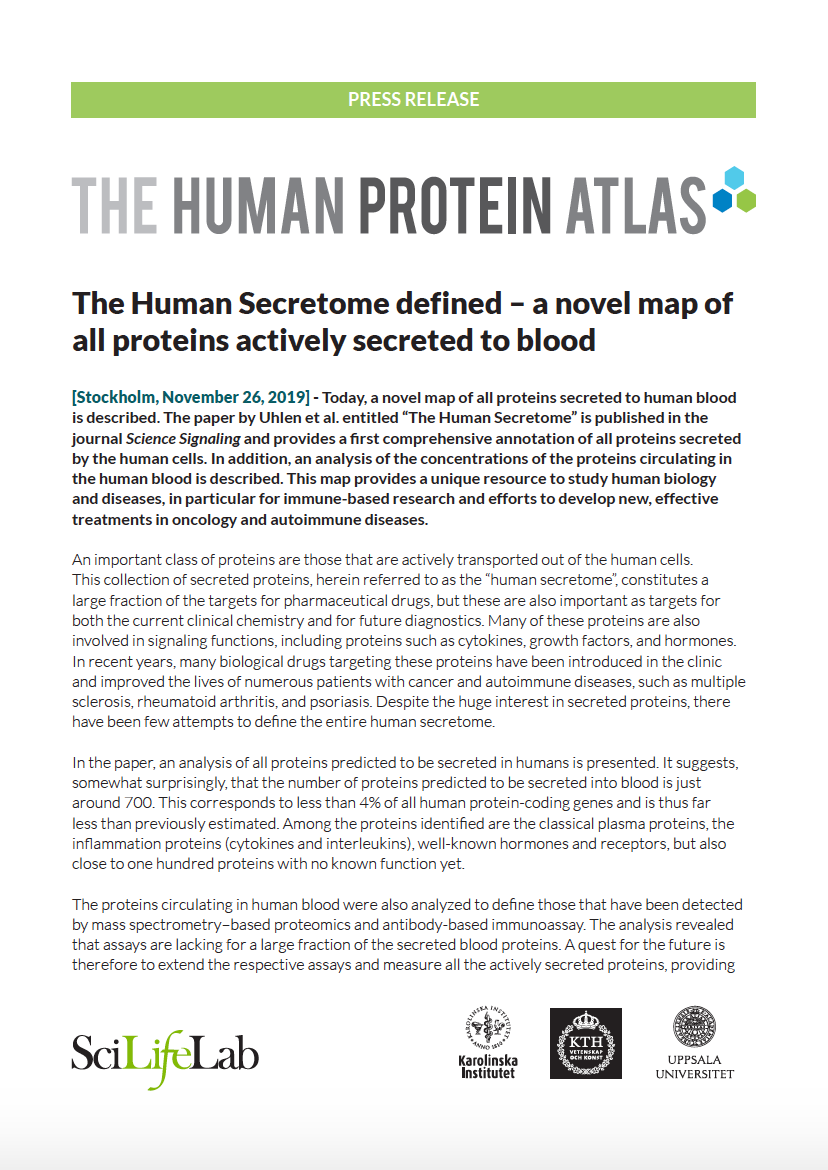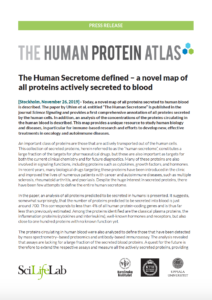Press release: The Human Secretome defined – a novel map of all proteins actively secreted to blood
[Stockholm, November 26, 2019] – Today, a novel map of all proteins secreted to human blood is described. The paper by Uhlen et al. entitled “The Human Secretome” is published in the journal Science Signaling and provides a first comprehensive annotation of all proteins secreted by the human cells. In addition, an analysis of the concentrations of the proteins circulating in the human blood is described. This map provides a unique resource to study human biology and diseases, in particular for immune-based research and efforts to develop new, effective treatments in oncology and autoimmune diseases.
An important class of proteins are those that are actively transported out of the human cells. This collection of secreted proteins, herein referred to as the “human secretome”, constitutes a large fraction of the targets for pharmaceutical drugs, but these are also important as targets for both the current clinical chemistry and for future diagnostics. Many of these proteins are also involved in signaling functions, including proteins such as cytokines, growth factors, and hormones. In recent years, many biological drugs targeting these proteins have been introduced in the clinic and improved the lives of numerous patients with cancer and autoimmune diseases, such as multiple sclerosis, rheumatoid arthritis, and psoriasis. Despite the huge interest in secreted proteins, there have been few attempts to define the entire human secretome.
In the paper, an analysis of all proteins predicted to be secreted in humans is presented. It suggests, somewhat surprisingly, that the number of proteins predicted to be secreted into blood is just around 700. This corresponds to less than 4% of all human protein-coding genes and is thus far less than previously estimated. Among the proteins identified are the classical plasma proteins, the inflammation proteins (cytokines and interleukins), well-known hormones and receptors, but also close to one hundred proteins with no known function yet.
The proteins circulating in human blood were also analyzed to define those that have been detected by mass spectrometry–based proteomics and antibody-based immunoassay. The analysis revealed that assays are lacking for a large fraction of the secreted blood proteins. A quest for the future is therefore to extend the respective assays and measure all the actively secreted proteins, providing a secretome-wide tool box of assays for the proteins in the blood and accelerate the possibilities to study human health and diseases.
The results are presented in an updated version 19 of the Human Protein Atlas (available at www.proteinatlas.org/blood) to provide an open-access knowledge resource of the human secretome to facilitate basic and applied research involving this important class of proteins. “We are excited to provide to the research community with this open access resource to facilitate future efforts to understand human biology and to improve patient care, in particular in fields such as immune-based therapies and blood-based assays”, says Mathias Uhlen, Director of the Human Protein Atlas program and senior author on the paper.
Read the full paper in Science Signaling
The work was funded by the Erling Persson Foundation and the Knut and Alice Wallenberg Foundation.
For more information, contact:
Inger Åhlén
Head of Communications at Human Protein Atlas
KTH, Stockholm, Sweden
ingera@kth.se
+46 8 790 99 87
Human Protein Atlas
The Human Protein Atlas (HPA) is a program based at SciLifeLab (Science for Life Laboratory) in Stockholm and started in 2003 with the aim to map all of the human proteins in cells, tissues and organs using integration of various omics technologies, including antibody-based imaging, mass spectrometry-based proteomics, transcriptomics and systems biology. All the data in the knowledge resource is open access to allow scientists both in academia and industry to freely access the data for exploration of the human proteome. The version 19 (launched September 5, 2019) consists of six separate parts, each focusing on a particular aspect of analysis of the human proteins; including the Tissue Atlas showing the distribution of the proteins across all major tissues and organs in the human body, the Cell Atlas showing the subcellular localization of proteins in single cells, and the Pathology Atlas showing the impact of protein levels for survival of patients with cancer, the Blood Atlas showing the profiles of blood cells and proteins in the blood, the Brain Atlas showing the distribution of proteins in human, mouse and pig brain and the Metabolic Atlas showing the presence of metabolic pathways across human tissues. The Human Protein Atlas program has already contributed to several thousands of publications in the field of human biology and disease and it has been selected by the organization ELIXIR (www.elixir-europe.org) as a European core resource due to its fundamental importance for a wider life science community. The HPA consortium is funded by the Knut and Alice Wallenberg Foundation.
www.proteinatlas.org or Twitter: @HumanProteome
Knut and Alice Wallenberg Foundation
The Knut and Alice Wallenberg Foundation is the largest private financier of research in Sweden and also one of Europe’s largest. The Foundation’s aim is to benefit Sweden by supporting basic research and education, mainly in medicine, technology, and the natural sciences. The Foundation can also initiate grants to strategic projects and scholarship programs.






